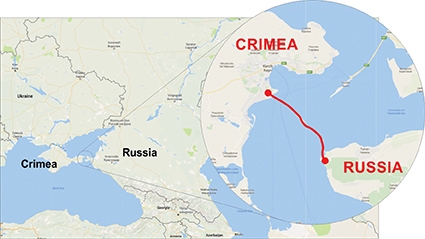Russia Closes Off Kerch Strait
The Ministry of Transport of the Russian Federation announced on August 7 the temporary closure of the international Kerch Strait. According to the official statement, the measure was related to the ongoing construction efforts of a bridge which would link the Russia-annexed Crimean Peninsula with the Russian mainland. Following the announcement, on August 9 a decision was made to close the strait to all maritime traffic except for Russian naval vessels. The closure threatens the strategically important Ukrainian ports Mariupol and Berdiansk and would deny the Ukrainians entrance to the Azov Sea. Mariupol and Berdiansk serve as outposts for exporting Ukrainian steel to the West and therefore the Russian move will have an impact on an already fragile Ukrainian economy.
Building the Kerch Bridge
The closure of the strait and the construction of the bridge over it are two interrelated developments. The announcement of the construction of the 12-mile-long Kerch Strait Bridge, with an approximate cost of over $3 billion, came after the annexation of Crimea. The road section of the bridge is scheduled to be operative from late 2018, while the rail link is slated for the following year.
It has been a long obsession of the Russians to connect the Russian mainland with Crimea, starting in 1870 when the British built a telephone line across the Kerch Strait to link with India. The line worked so well initially that they contemplated adding a railroad bridge over it. However, construction was deemed too expensive.
The Russians came back to the idea under Tsar Nicholas II but it moved no further than a simple consideration as World War I approached.
Surprisingly, it was the Germans who made the first attempts to connect the peninsula to the Russian mainland. Construction began following the seizure of Crimea by the Wehrmacht. For the Germans, the bridge would play a key role in supporting the Nazi war efforts in southern Russia. As testament to how seriously the Germans were considering the idea is Adolf Hitler's decision to appoint his architect and minister, Albert Speer, as a supervisor for the project.
However, soon after construction began, the Soviet counter offensive began, driving the Germans from the occupied part of Ukraine. The Soviets managed to complete a bridge in 1944 and it was even used by the governmental delegation headed by Josef Stalin to return to Moscow from the Yalta Peace Conference. Later, instead of repairing the then-fragile bridge, it was decided to dismantle the construction. In 1954, a special ferry between the Crimean town of Kerch and the town of Taman in southern Russia was initiated.
Geopolitical Reasons
Although the Russian decision to temporarily close the strait was officially related to construction measures and may not indeed be extended, it nevertheless reflects the Russians’ strategic thinking and concerns. The Kerch Strait is an approximately 25-mile-long channel that is no wider than 9 miles. The strait links the Black Sea to the Azov and is important as it allows the control of water routes and energy resources coming in and out of the Azov Sea.
Thus, it was inevitable that Russia and Ukraine would fight for the territory. Indeed, there were cases even well before Russia-Ukraine relations plunged. In 2003, Russia and Ukraine nearly went to war over the strait crisis when Russia started construction of a bridge to one of the islands in the Azov Sea.
However, following the Euromaidan Revolution in Ukraine in 2014, the dispute between Moscow and Kiev has taken a much more serious turn, seeing the two countries now battling for control of the Black and Azov seas’ military and economic communication lines.
The Kerch Strait is a continuation of the Northern Caucasus into Crimea, home to Russia's Black Sea Fleet located at Sevastopol. That is why Moscow is concerned that the pro-Western government in Kiev could potentially allow the strait to be used by Western military fleets and even NATO. Russians want to keep direct access to the Don River safe, closed to the military alliance. Moscow also thinks that, theoretically, the strategically important Don River could be used by foreign troops to enter Russian mainland.
As such, we need to put the Russian decision to close the strait into a wider geopolitical perspective. Yet, even if the closure turns out to be only a temporary move, Moscow is sending a clear message to Kiev on the pressure tools it has to hand to limit potential Western military encroachment on strategic routes in the Black and Azov seas.
Emil Avdaliani












